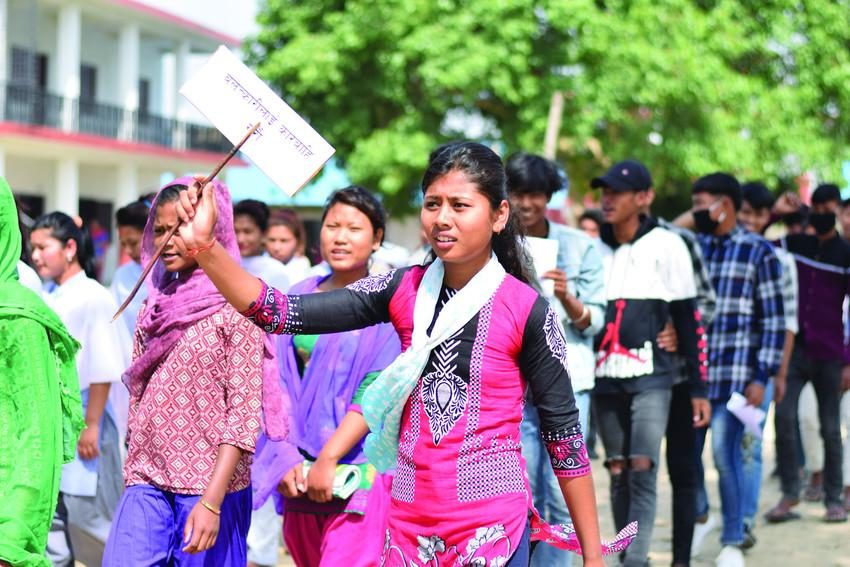Worldwide Annual Review 2025
A summary of our global impact for children, particularly girls, in 2025.
From Gandhi’s passive resistance to LGBTIQ+ Pride, history holds great examples of grassroots campaigns that have gone on to change the world. More recently, young people have been at the forefront of some of the most impressive environmental and social justice campaigns to shape our future. Get inspired.

Last August, 16 year old Greta Thunberg protested daily outside Swedish parliament to demand the country reduce its carbon emissions by 15%.
Her bold and defiant action snowballed, leading to more than 1.4 million young people across more than 300 cities worldwide joining her to highlight the issues of climate change and global warming by March 15th 2019.
This was the largest instance of climate action ever.
“We proved that it does matter what you do and that no one is too small to make a difference,” Greta said of the movement she has inspired.
School strikes are still happening across the globe with no sign of stopping until young people’s demands are heard.
Why it worked?
Greta’s age and tenacity got her story into the world’s press and her passion clearly resonated with young people across the globe.
Young people taking a stand, collectively and visibly on an issue so many power-holders ignore is a time-honoured tactic that has helped achieve many social and environmental wins throughout history.
Long may it continue.
In 2016, a woman dressed as a bride covered in blood stained bandages stood in front of the Parliament of Lebanon.
Inside, a committee discussed the abolition of Article 522 a law allowing men to avoid punishment for rape if they married their victim.
Campaigners, led by gender equality and economic development organisation Abaad MENA, used a variety of tactics in the following months to highlight the abhorrence of the law in highly public places. These included a flash mob at the end of the Beirut Marathon and a pop-up prison containing girls in wedding dresses in the middle of the city with the slogan “a white dress doesn’t cover the rape.”.
The supporting campaign video reached 20.8 million views on social media.
Why it worked?
Many Lebanese people were not aware such a law still existed and the campaigners’ choice to play with shock value – the horror of young women in wedding dresses covered in blood – helped get the attention of the world’s media. The disgust of the Lebanese public, made it almost impossible for policy-makers to then uphold such a law.
Following this campaign’s success, Tunisia and Jordan amended similar laws, showing the power of a powerful, media-friendly, well-executed campaign.
At the end of August 2017, Chile’s Constitutional Tribunal voted to legalise abortion in three instances: when a woman’s life is in danger; when the fetus is not viable; or when the pregnancy is the result of rape. Previously it was one of four Latin American countries with an outright ban on abortion in any instance.
This first step towards girls’ and women’s bodily autonomy was achieved with the help of 10 girls’ and women’s rights organisations joining together to put pressure on decision-makers and advocate for reproductive health and rights.
One of the groups, MILES Chile created shocking and powerful videos to get their message across, highlighting the danger of unsafe abortions likely to continue without the law change.
Why it worked?
Chilean feminist groups joined together to push for law change showing the power of collaboration.
They were spurred into action with the support and encouragement of the country’s first female president, Michelle Bachelet, who held office until 2018.
When women are in power they are often more likely to champion girls and women’s issues. However, reproductive rights continue to be a contentious and emotive issue across the globe.
Youth for Change (YfC) were inspired to campaign against sexual harassment and gender-based violence on public transport, after the rape and murder of a law student named Rupa Khatun on a bus in Dhaka in late 2017.
News of the attack circulated on social media, leading YfC to capitalise on the conversation. The group conducted an online survey finding that 100% of female respondents had experienced sexual harassment on public transport at least once in their lives.
“We took the data and approached the President of Child Rights Caucus of the National Parliament and the National Human Rights Commission,” says the group’s co-founder, Sifat.
“Dialogues held in Dhaka and Bharishal (region of Bangladesh where the majority of people use waterways to travel to the capital) ultimately led to a separate deck and toilets for female passengers on city boats,” says Sifat.
The group printed and shared stickers for public transport with a toll-free helpline number for sexual harassment complaints, which could eventually be found all over the country in schools, on transport and in workplaces. The initiative was later taken on by the Bangladeshi government.
Why it worked:
YfC sprung into action when sexual harassment and violence was trending in the media and took the opportunity to plan a multifaceted campaign.
The group used social media to involve Bangladeshi women and validate their experiences of harassment. Public dialogues with policymakers were held at a time where they could not be seen to dismiss the issue after such a violent attack, and achieved meaningful change.
In addition, understanding how important male allies are for gender equality, the group made a video encouraging men to speak out against harassment when they see it, which was shared widely and won a national award.